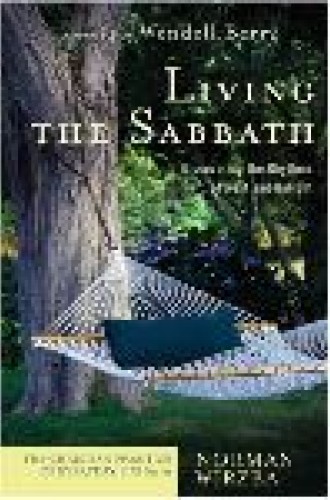Living the Sabbath
In a high school sociology course called “Man in Society”—the very title dates me—one assignment was to dream up hobbies we might pursue in middle age. We were told that with the explosion of labor-saving devices none of us would work more than half-time by middle age, and we would suffer an emotional breakdown without rewarding ways to pass the time. Not only the name of that course proved problematic.
I encounter persistent complaints about having too much to do in too little time and having no room in life for the things one values most. Church members, students, colleagues, friends and even retired folks complain about “time poverty” and “hurry sickness.” This sense that something is awry is neither imagined nor anecdotal: North Americans are busier and work longer hours now than several decades ago.
That the wider culture is starting to take notice is most evident in various “slow movements.” But many responses are not especially helpful, relevant or applicable. It is not enough to whine about the good old days when blue laws restricted activities one day a week. And time-management techniques often make us only more obsessed with schedules, reinforcing the tyranny of the urgent. Too often we talk about symptoms; too seldom do we address substance.
Abraham Heschel’s The Sabbath remains one of the finest pieces ever penned about faithfully approaching time. Norman Wirzba contributes a volume worthy of standing alongside Heschel’s. Wirzba directly addresses “today’s culture of exhaustion and destruction.” He rues “the fact that the nations most formed by a biblical ethos—those in North America and Europe—while having a modest 11 percent of the world’s population, are responsible for 60 percent of the world’s consumer expenditures.” He laments the reality that “in our information and technological age, when we purportedly have more knowledge than ever before, we are witnesses to and agents of the most widespread ecological destruction and communal disintegration the world has ever known.”
Writing about Sabbath grows more common. Even secular disciplines are beginning to see its merit. But too many writers offer only simplistic proposals for routinely and regularly guarding a little calendar space. Wirzba avoids such pitfalls by seeing the Sabbath comprehensively. (He also pessimistically notes that many people will no longer be able to find one day to take off per week!)
Wirzba argues that “Sabbath observance is the fulfillment . . . of a religious life that is harmoniously tuned to the life-giving and life-promoting ways of God.” Sabbath living means “bringing our habits and priorities in line with the ways and intentions of God.” Such an expansive approach does not depend on cultural sanction or blue laws but is rooted in and reinforced by the values and priorities of Christian community. It does not mean we have to understand and resolve all the complexities; after all, the Jewish community honed Sabbath traditions over many centuries, not always getting everything right.
This book suggests directions for “living the Sabbath” at all times by honoring “a deep appreciation for the diverse and costly ways of God’s grace” and learning to live in gratitude and celebration. “The Sabbath is not a break from life but rather a profound theological lens” for examining life. It is bound up with salvation. Wirzba notes how far removed this is from a culture that not only has lost the ability to experience true delight but constantly contends with boredom and alienation. He plumbs theological themes of hope and theodicy, authentic work and fidelity, hospitality and economic faithfulness.
Especially refreshing is Wirzba’s consistent connecting of these themes to the mundane but central matters of food and eating habits, which are always significant to biblical faith. He is much influenced by Wendell Berry and cites him often. (Berry wrote the book’s foreword.) I have read a lot about Sabbath and time issues, and much on food and agriculture issues as well, but nowhere have I encountered such a rich and promising connection between the two. “The real issue is whether we can learn to grow food and eat in a way that reflects thanksgiving and praise to God.” Wirzba considers how worshiping communities of Christians can form us in joyful ways of life. Spiritual disciplines have everything to do with what “we eat, how we dress, the places we shop, the kinds of homes we live in, the cars we drive, and the occupations we choose,” all of which are intrinsic to a life of worship.
I do not rest easy with mere complaints about the harried pace of life. And obviously my high school sociology course did not adequately prepare me for current challenges. Norman Wirzba, however, opens real possibilities for living in a way that honors and embodies rest, remembering, refocusing and thanksgiving.



